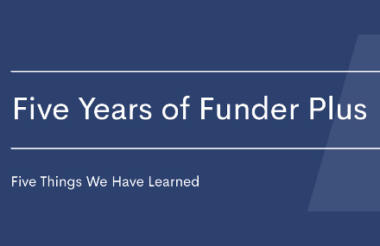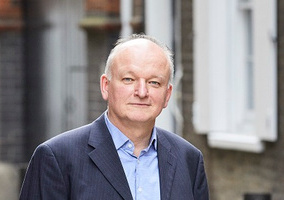As we launch our report, Five Years of Funder Plus, Five Things We’ve Learned what’s clear is that providing “the right support, at the right time, in the right way” isn’t always straightforward. At Lloyds Bank Foundation England and Wales we’ve amassed five years’ experience of this, supporting 800 small and local charities in areas like finance and fundraising, strategy and planning, communications, monitoring and evaluation, leadership and governance.
The road hasn’t always been easy. As the independent evaluations of our projects show, there are things we’ve got wrong, and learned from - and yet we can confidently say that, five years from the start line, our team of amazing grant managers seem to have worked out just how to provide the support that charities really value. Here are five key things we’ve learned along the way:
Build trust
We are very keen to work with the charities we fund on a partnership basis, supporting them over many years to become stronger and more fundable. Asking charities to treat us as a partner, moving beyond a traditional funder-funded relationship is a bit of a leap of faith for them, and it won’t work at all unless rapport and trust is built on both sides.
Work hard on diagnostics
We try to help charities think not about what they want, which are often presenting issues, but think deeper to what they need. This is the art of a good diagnostic conversation and takes some courage for charity chief executives; they need to be willing to show their vulnerability and be prepared to accept external help and advice.
Put grantees in the lead
We know being a chief executive can be a lonely job, sandwiched between staff and trustees with often no-one to talk to about their struggles. This is why the most important skill of any of our support providers is listening. Not jumping in and criticising, but listening and supporting and questioning, both to get things done and to think ahead. Chief executives must take time to assess their own capacity to engage, and to feel empowered to say no if it’s not the right time for the support to make a significant impact.
Invest in leadership
Time and space to think are rare luxuries for often beleaguered chief executives, so we try to create the opportunities for charity leaders to step off the treadmill through local forums or networks, with people who can ask the right questions, share knowledge and experience and listen objectively. In the commercial world, time to develop and learn is taken for granted but for charities it often comes with a terrible guilt complex, driven by a long queue of people desperate for some help.
As a key part of our capacity building programme we offer training opportunities, for example with the School for Social Entrepreneurs, where charity leaders spend eight days together over six months, learning about sustainability and trading. They stay together in a hotel, which is the glue that builds peer networks and enduring friendships. The strongest outcomes from this work are not the tangible ones, (although there are also lots of those) but the increase in participants’ confidence to act. I often welcome the participants at the beginning of the course and there’s a palpable sense of imposter syndrome in the room. Magically this is dispelled by the end of the course, with participants leaving feeling fired up, enthused with self-belief, and ready to go back and change the world some more.
Upskill, embed and sustain
Used well, the development support we offer can be transformational, especially if there is a significant knowledge exchange, but it does take time and commitment. To help charities make this time, we’ve made changes to our grants programmes to pay charities for extra staff hours or so they can delegate responsibilities elsewhere in their organisations to allow them to properly engage. This means that charity leaders we work with are upskilled and change can be culturally embedded and sustained for the longer term.
Our Commitment
Our capacity building journey has been a continual learning process and it doesn’t stop here. By publishing our learnings today, we hope to start a conversation about how sector leaders can best work together to make help charities to be the best they can be.
Our grantees sometimes tell us that our development support has been as instrumental – or more instrumental - than their grant, helping them to influence externally and leverage other funding, and that’s feedback we need to listen to. By helping charities leaders to re-ignite their passion we believe they’ll do extraordinary things and take on those challenges that are in the ‘too difficult’ box.
We need these fantastic people. We need them to feel strong and resilient and capable. The charities we fund are so inspiring: I often wonder how they do it, day after day in such a tough climate. We’re proud to be able to support them to be awesome and change the lives of the people who come through their doors. We know we’d all be much worse off without them.
Harriet Stranks is director of grants at Lloyds Bank Foundation for England and Wales
Related articles











